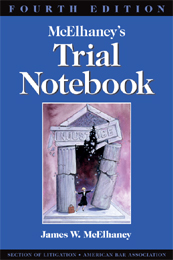« Litigation: If you bill by the hour, why not bill twice a month? | Main | Client Town or Lawyer Town? »
August 19, 2009
Litigation: Quit wasting depositions, deposition time, and deposition money.
Why use deposition time to learn things you can learn quickly and inexpensively from (a) phone calls, (b) libraries and (c) even the most rudimentary Google search?
--DC trial lawyer Ernie from Glen Burnie, speaking with paralegals and associates, circa May 2009.
Before you schedule a deposition, do a simple investigation. Save time and money; get better results. You get the idea. Twenty years ago, James McElhaney, a gifted lawyer, writer and teacher of trial tactics, and the ABA Litigation Section, first published McElhaney's Trial Notebook, now in its fourth edition.
Discovery, McElhaney noted, is a good way to learn what a witness will say, or to bind a party or witness to a particular version of the facts.
But formal discovery, he went on, "is a very inefficient way to get information."
Let me add to that. Formal discovery can be--and often is--an unimaginative, cookie-cutter, straight-up lazy, and truly "anti-client" way to learn. On this subject, there are lots of investigation ideas in McElhaney's book, but they all involve simple curiosity and do-it-yourself "trolling" for information the trial lawyer gets first-hand on his or her own.

Next time a new case begins, resist rushing into written discovery and depositions.
Step back from the discovery routine--you'll get into that bubble soon enough--and learn a few things on your own.
Just as witnesses say unexpected and even startling things when they testify, useful and even surprising facts are available about opposing parties through the Internet, court files, published cases, D&B reports, news archives and business libraries. These inexpensive but ignored sources are often inconsistent with information parties will give about themselves in formal discovery.
The upshot?
1. Don't take the deposition at all. You may not need to take that deposition.
2. Take a much better and shorter one--and do much better written discovery requests. If you do take it, you will take a better one. You won't need to waste time asking about things which are easily ascertained beforehand. If you serve written discovery before depositions--you generally should do it before--your interrogatories and requests for documents under Rules 33, 34 and 45 will be much better. (Formal written discovery, in my view, is of even poorer quality and even less informed than most depositions taken.)
3. If you need to, confirm what you have learned with a quick series of leading questions. Anything that you have learned about the deponent from investigation and informal discovery, and that you need to confirm--i.e., work history, education, club memberships, past events in the news, addresses, past titles, writings, current and past businesses and business associates? Go over it and confirm quickly at the outset (or at the right interval for that information) with the deponent quickly.
4. Bonus: Opposing litigation counsel--especially those civil trial lawyers of the generic go-through-the-motions "law cattle" persuasion--will take you and yours very seriously.
Posted by JD Hull at August 19, 2009 11:59 PM
Comments
Great post. In my last med mal trial I did not depose any of the experts identified by the defense - they disclosed 10 or 12 different experts. They called 6 or 7 at trial, including ER docs, nephrologists, cardiologists, and a transplant surgeon. By cross-examining the experts based on our independent investigation, their Rule 26 disclosures, and their (lack of) knowledge of the facts, we were able to serious damage to them. If we had deposed them we would have tipped them off as to our attack and, if we had ever saw them at trial, they would have been prepared for what was coming. Similarly, the back-up experts (they were at least 2 deep in every specialty) would have been better prepared. Money saved in out of pocket expenses to the client: $30,000.
My rule: begin with the notion that no depositions should be taken, and then justify to yourself why the juice is worth the squeeze with regard to each deposition you think you might need to take.
Posted by: John Day at August 19, 2009 05:55 PM